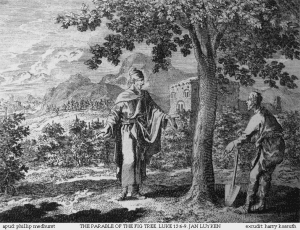“Leave it alone for one more year, and I’ll dig around it and fertilize it. If it bears fruit next year, fine! If not, then cut it down.” ~Luke 13:8-9
 The Greek phrase for what the farmer wants to do to the tree is literally “Dung it.” Most English Bible translations say “Fertilize it.” A couple of them, including the Revised Standard Version, use “manure.” But the old King James and American Standard Versions go with the literal “Dung it.” It’s a weird little line in a short little parable. But the solution to the barren fig tree is to give it more time and spread around a little manure (No, that doesn’t mean preach to the tree).
The Greek phrase for what the farmer wants to do to the tree is literally “Dung it.” Most English Bible translations say “Fertilize it.” A couple of them, including the Revised Standard Version, use “manure.” But the old King James and American Standard Versions go with the literal “Dung it.” It’s a weird little line in a short little parable. But the solution to the barren fig tree is to give it more time and spread around a little manure (No, that doesn’t mean preach to the tree).
Manure is not a word, especially back then, that anybody would use in a religious illustration or religious teaching. It’s just not polite. It’s gross. In fact, this is the only place in the entire New Testament this word is used. Why do you think Jesus said “manure?” He could have said, “Let me bring in some better soil” or “Let me water the tree” or “let me prune some branches.” Why did he say, “Let me dung the tree?”
Well, there’s nothing glamorous about manure. It’s not exciting. It’s messy. Smelly. And it takes time. It’s not a quick fix. Digging around the tree, mixing in the manure, caring for the tree, nurturing the tree, paying careful attention to the tree — that takes patience. And great restraint. It’s going to take a while to see if it makes any difference.
Normally we want immediate results. So chopping down the tree seems like the best thing to do. We clear the ground out and get ready for a new tree. A new start. A new beginning. We love new beginnings: new efficient programs, new shiny buildings, new attractive members, new exciting projects, new fulfilling jobs, new shock-and-awe wars. But spreading manure has none of that exhilaration. It’s not dramatic. It doesn’t get anybody’s admiring attention. Manure is a slow solution. And it sounds a lot like our Lord, huh? Jesus is very much about the small, the slow, the unglamorous: yeast and salt and seeds. And manure.
This is how our God deals with people. Patience and restraint. Slow. I don’t care what 2 Peter says, God is slow. He’s not in a hurry. Scripture tells us over and over again we need to wait on God. And Scripture also tells us that God spends a lot of his time waiting on us.
“The Lord is not slow in keeping his promise, as Allan understands slowness. He is patient with you, not wanting anyone to perish, but everyone to come to repentance… Bear in mind that our Lord’s patience means salvation.” ~2 Peter 3:9, 15
The holy God of Heaven and Earth holds off on his judgment, he delays his punishment, he refrains from putting the ax to the root because he loves us. He gives us time. And while he gives us this time, he nurtures us and takes great care of us. He carefully digs around us and blesses us with love and mercy and forgiveness. God keeps coming to us, keeps sparing us, keeps giving us opportunities and unlimited chances to respond. He never gives up on us. He keeps forgiving.
For me not to respond to that grace, for me to go through my life every day and not make changes, not start bearing Kingdom fruit for his glory — I’m without excuse.
“Do you show contempt for the riches of his kindness, tolerance, and patience, not realizing that God’s kindness leads you toward repentance?” ~Romans 2:4
If God dealt with us strictly by his holy justice, we wouldn’t stand a chance. But he doesn’t. He is patient with us. He gives us time and second chances and third and fourth and fifth and sixth chances to repent. That’s patience. Grace. The Master’s been digging around you for years. He’s been reaching out to you and taking loving care of you for a long time. You’ve responded, right?
Peace,
Allan
Leave a Reply